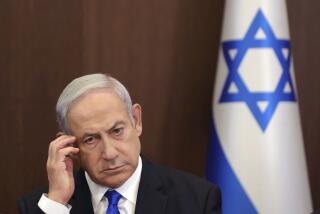A Presumption of Guilt in Iran
- Share via
Thirteen Iranian Jews accused of spying for Israel are scheduled to go on trial in Shiraz on Monday, still unsure after more than a year in custody precisely what they are alleged to have done. A Los Angeles source in close touch with events in Iran says that their lawyers, only recently chosen, have been given files that lack any specific charges or evidence. In a case where the death penalty has been demanded by leading clerics, the defendants and their lawyers thus face the Kafkaesque nightmare of not knowing what they must be prepared to defend against.
The 13 are widely seen as pawns in the continuing power struggle between moderates like President Mohammad Khatami, who, among other things, wants to improve Iran’s external relations, and conservatives whose paramount interest is maintaining their pervasive and repressive religious authority.
Iran’s Jewish community has shrunk more than half, about 35,000, since the Islamic revolution of 1979 and, given the regime’s unremitting hostility toward Israel, it is always closely monitored. That intense scrutiny by itself makes it highly unlikely that any Iranian Jews would have the inclination, or even the chance, to engage in espionage.
The case has drawn unusually wide international attention. Britain, France, Germany, Japan, Canada, the European Union and even Russia, among others, have joined the United States and Israel in expressing concerns and issuing protests. France’s Premier Lionel Jospin has abandoned the usually circumscribed language of diplomacy and called the charges against the 13 “totally fabricated.”
In the past the regime has similarly accused members of another religious minority, the Bahai--which the clerics consider a heretical sect--of spying and sedition, and it has executed many of those its courts convicted.
Elections in Iran, first of Khatami three years ago and more recently of a new legislature, have demonstrated overwhelming popular support for an easing of strict theocratic rule and for more rational answers to Iran’s deepening economic problems.
The clerical response has been to crack down on press freedom--even the paper run by Khatami’s brother has been shut down--and use force to break up demonstrations. The prosecution of the 13 Jews should similarly be seen as essentially a coercive flexing of muscle.
The trial is scheduled to take place before a revolutionary court, where proceedings are usually closed and almost always swiftly concluded. Unless the trial is open to independent observers it won’t be possible to assess the validity of whatever evidence is presented, but certainly it will be possible to doubt the credibility of the regime’s prosecution.
For more than a year the atmosphere around the pending trial has been made toxic by the conservative media and prominent Muslim clerics, who already have proclaimed the guilt of the accused and demanded that they be executed. Only an open trial would let the world weigh the fairness of the proceedings and the verdict, if in fact fairness matters at all to the Iranian authorities.
More to Read
Sign up for Essential California
The most important California stories and recommendations in your inbox every morning.
You may occasionally receive promotional content from the Los Angeles Times.













